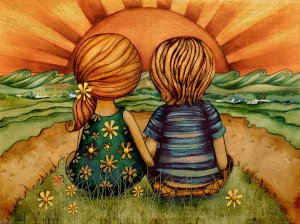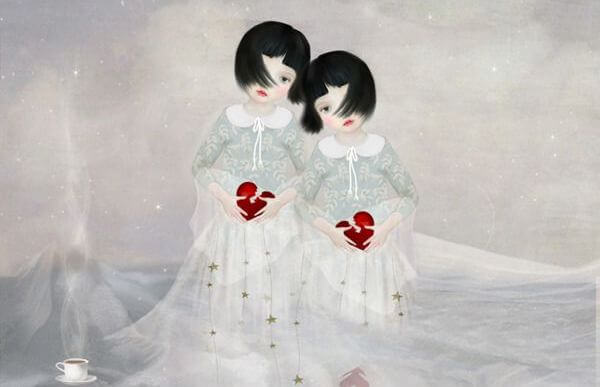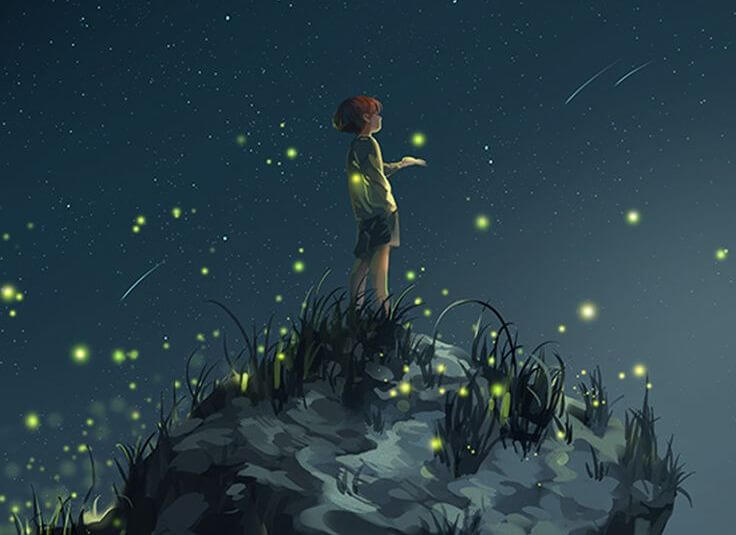Know The Difference Between A Happy Child And A Spoiled One

Being the preschool teacher that I am, there is a claim that bothers me enormously, and it is confusing the need that little ones have for certain limits with the unfortunately popular “heavy hand.” A fallacy that is entirely inefficient, for a happy child and a spoiled one have absolutely nothing to do with one another and the two concepts must not be confused.
Therefore, I would like to make a small plea from my humble point of view to learn the difference between a happy child and a spoiled one. For this, I would like to concentrate on a quote from the famous American psychiatrist Karl A. Menninger: “What’s done to children, they will do to society.”
Differences between a happy child and a spoiled one
There are many differences between what defines a happy child and a spoiled one. And let us not forget that, just as Menninger says, what we do to our little ones is what they will offer and demand of society and the environment in which they develop.

Childhood is a vital stage in a little one’s life, for this is when they start to interiorize values, abilities, skills, or predilections, among other things. A soft of malleable figure that we must respect and educate with all the affection in the world and an appropriate, cross-cutting education for the planet that we want to build.
Demands
Among the differences that we find w hen we compare a happy child with a spoiled is the extent to which the child makes demands. A spoiled child will constantly have a series of demands that, when not fulfilled, lead to anger and tantrums, for they have become accustomed to getting what they want. When they don’t, their anger can be monumental, as well as their frustration and rage.
However, a happy child quickly learns the value of things. They know how far they can go from an early age and they do not feel such a high degree of frustration if they do not possess a particular item.
The development of a system of values
A spoiled child has a very limited system of values, which often matches the idea of “if you can pay, you can stay,” for this is how they have been educated, and this is what they have seen in their surroundings.
Meanwhile, a happy child who grows up in surroundings where he feels wanted and understood develops a system of values in which he understands the meaning of love, peace, freedom, or solidarity much more quickly. For a happy child, possession is not so important, and they do not need objects or toys to feel good; they only need affection and understanding.

Character
A spoiled child will often develop a character tending towards frustration and tyranny from a very young age. They soon learn that if they want something, they must demand it vehemently, without knowing precisely why this is. They simply associate anger and rage with reward.
A happy child, on the other hand, tends to have a more sensitive character and quickly becomes accustomed to asking for whatever it is he desires. In addition, they develop tools for protecting themselves against frustration, strategies for getting what it is they want by their own means, and a less dependent attitude.
Level of understanding
Between a happy child and a spoiled one, their ability to understand the world will definitely stand out. If a child has everything, he does not need to see anything more and he can lose his ability to investigate and develop.
A spoiled child who immediately has everything that he wants develops a low level of curiosity for the things around him and a negligible interest in learning and understanding. If they believe they need something, they demand it and do not look beyond this.
A happy child develops in an environment filled with understanding, curiosity, and a desire to know and learn about the world in which he lives. This is part of life and their own life progression.
“Children have more need of models than of critics.”
-Carolyn Coats-
You can see that the differences between a happy child and a spoiled one are numerous and very clearly defined. It is not a matter of children having everything, but of them learning to get it in a cordial and friendly way.
Being the preschool teacher that I am, there is a claim that bothers me enormously, and it is confusing the need that little ones have for certain limits with the unfortunately popular “heavy hand.” A fallacy that is entirely inefficient, for a happy child and a spoiled one have absolutely nothing to do with one another and the two concepts must not be confused.
Therefore, I would like to make a small plea from my humble point of view to learn the difference between a happy child and a spoiled one. For this, I would like to concentrate on a quote from the famous American psychiatrist Karl A. Menninger: “What’s done to children, they will do to society.”
Differences between a happy child and a spoiled one
There are many differences between what defines a happy child and a spoiled one. And let us not forget that, just as Menninger says, what we do to our little ones is what they will offer and demand of society and the environment in which they develop.

Childhood is a vital stage in a little one’s life, for this is when they start to interiorize values, abilities, skills, or predilections, among other things. A soft of malleable figure that we must respect and educate with all the affection in the world and an appropriate, cross-cutting education for the planet that we want to build.
Demands
Among the differences that we find w hen we compare a happy child with a spoiled is the extent to which the child makes demands. A spoiled child will constantly have a series of demands that, when not fulfilled, lead to anger and tantrums, for they have become accustomed to getting what they want. When they don’t, their anger can be monumental, as well as their frustration and rage.
However, a happy child quickly learns the value of things. They know how far they can go from an early age and they do not feel such a high degree of frustration if they do not possess a particular item.
The development of a system of values
A spoiled child has a very limited system of values, which often matches the idea of “if you can pay, you can stay,” for this is how they have been educated, and this is what they have seen in their surroundings.
Meanwhile, a happy child who grows up in surroundings where he feels wanted and understood develops a system of values in which he understands the meaning of love, peace, freedom, or solidarity much more quickly. For a happy child, possession is not so important, and they do not need objects or toys to feel good; they only need affection and understanding.

Character
A spoiled child will often develop a character tending towards frustration and tyranny from a very young age. They soon learn that if they want something, they must demand it vehemently, without knowing precisely why this is. They simply associate anger and rage with reward.
A happy child, on the other hand, tends to have a more sensitive character and quickly becomes accustomed to asking for whatever it is he desires. In addition, they develop tools for protecting themselves against frustration, strategies for getting what it is they want by their own means, and a less dependent attitude.
Level of understanding
Between a happy child and a spoiled one, their ability to understand the world will definitely stand out. If a child has everything, he does not need to see anything more and he can lose his ability to investigate and develop.
A spoiled child who immediately has everything that he wants develops a low level of curiosity for the things around him and a negligible interest in learning and understanding. If they believe they need something, they demand it and do not look beyond this.
A happy child develops in an environment filled with understanding, curiosity, and a desire to know and learn about the world in which he lives. This is part of life and their own life progression.
“Children have more need of models than of critics.”
-Carolyn Coats-
You can see that the differences between a happy child and a spoiled one are numerous and very clearly defined. It is not a matter of children having everything, but of them learning to get it in a cordial and friendly way.
This text is provided for informational purposes only and does not replace consultation with a professional. If in doubt, consult your specialist.







